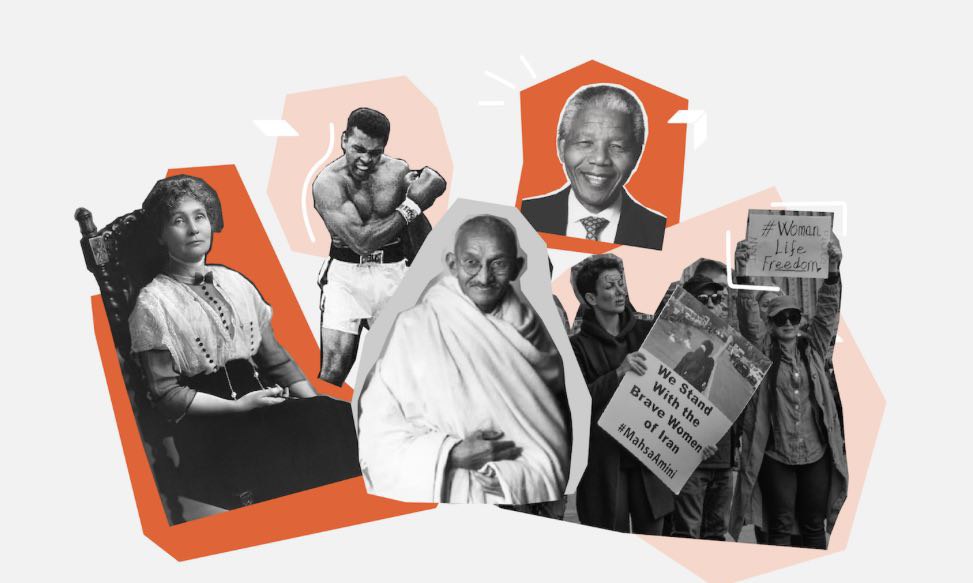Civil disobedience is a civic duty.
Civil disobedience means any deliberate and overt act of breaking the law with the intention of drawing public attention to the illegitimacy or incorrectness of certain laws, based on ethical and rational grounds.
Civil disobedience strategy, particularly used by Mahatma Gandhi to achieve India’s independence from British imperial rule, involved non-compliance with national laws, refusal to pay taxes, rejection of government positions, boycotting legislative elections, non-cooperation with British officials, and boycotting British-made goods.
In passive resistance, the main emphasis is on abstaining from action and a kind of indifference, whereas civil disobedience does not have any meaning without some form of action. The common aspect of these two peaceful resistance methods is their non-violent nature. In passive resistance, this non-violence is achieved through abstaining from action, while in civil disobedience, it is achieved through a form of action.
Civil disobedience is also translated as public disobedience, although it is not an exact translation, it contains accurate points, namely that civil disobedience, if limited to a few individuals and not widespread, will be practically ineffective.
However, such an action always has a starting point, and that starting point is the rebellion of a few specific individuals against a law or laws that are not widely accepted by the people. But not everyone has the courage to rebel against them. The individuals who initiate this defiance of the law may inspire others and lead them into the valley of breaking laws that are not considered fair by public opinion.
For example, on December 1, 1955, Rosa Parks refused to give up her seat on a bus to a white man, and as a result, she was arrested and fined. She holds a special place in American history, and her defiant act against racial regulations is considered a symbolic starting point of the Civil Rights Movement for African Americans in America.
Rosa Parks’ refusal to surrender her seat on a city bus to a white man and her subsequent arrest led to the widespread boycott of the public transportation system by African Americans. Rosa Parks was one of the activists of the American Civil Rights Movement and later recognized by the United States Congress as the mother of the Freedom Movement and the first lady of the Civil Rights Movement.
Opponents of civil disobedience, even if they don’t inherently believe in the law, insist on the necessity of legalism to illegitimately present this strategy. However, such emphasis is justified only when the law is changeable. A law that is not supposed to change is not actually a law, because in the modern world, the law in the true sense of the word must be derived from the will of the people. Furthermore, future generations in any nation can change the laws enacted by previous generations.
A law derived from the will of the people, even if not easily changed, has a clear path for its modification and requesting its change is not considered a crime. For example, in the United States, laws regarding the legality of buying and selling firearms have shown great rigidity based on the Second Amendment to the U.S. Constitution, which affirms the people’s right to own and carry firearms. However, requesting the repeal of these laws or engaging in protest gatherings to abolish them is not a crime, and fundamentally, changing these laws and even modifying the Second Amendment to the U.S. Constitution is possible and does not fall under impossibilities or absurdities.
Furthermore, some opponents of civil disobedience try to present a truly, not apparently, secular and rational basis for their opposition by relying on a kind of Socratic legalism. This means that as long as a law has not been abolished by the government, namely the legislative, executive, and judicial system, it must be obeyed, even if it is considered unjust. Just like Socrates, who, despite considering the court’s verdict against him unjust, did not accept the suggestion to escape from prison and submitted to the enforcement of the law.
However, defenders of civil disobedience argue for the defense of just laws and advocate for citizens’ right to dissent from unjust laws. Some even believe that a government that enacts unjust laws is itself criminal, and consider the actions of those who violate such laws as justified civil disobedience. This is because their behavior is directed towards justice and, for this reason, is lawful.
The underlying assumption in this hypothetical argument is that a law must be just, and an unjust law is not a legitimate law. Therefore, violating such a law does not count as a violation of a legitimate law. In the famous debate between Noam Chomsky and Michel Foucault about the nature of humans, Chomsky defends this perspective on law and argues that derailing a train in America carrying weapons and ammunition for the Vietnam War is only considered illegal by the US government, but it is actually a justifiable action because it serves the cause of justice.
From this perspective, the concept of civil disobedience is also dissolved, and actions and laws are divided into two categories: just laws that must be respected until further notice, and unjust or unjustifiable laws that do not require compliance.
But how can we determine if a law is just or not? Chomsky’s answer is that humans have a nature and are not solely products of a particular society or historical period. Therefore, they can discern right and wrong, justice and injustice, based on their own rationality and perception derived from their own essence. Understanding these concepts is not solely dependent on political propaganda or intellectual productions aligned with the government.
In this regard, Socrates was right in not obeying the seemingly lawful judgment of his trial because it was unjust. In fact, Socrates and his disciples had the right to civil disobedience against the Athenian government, although according to Chomsky, it was not considered civil disobedience, but rather an act of justice.
Therefore, resorting to Socratic legalism becomes ineffective when the concept of justice and the necessity of aligning laws with justice are raised. This point is important because civil disobedience usually occurs when a large social group, such as the people of India under British rule or African Americans in the United States, becomes dissatisfied with the existing situation, which is based on the law, and evaluates the existing legal situation as unjust or oppressive.
Usually, civil disobedience does not arise in cases where there are minor or brief criticisms of a law or a legal situation. The occurrence of such phenomena worldwide is usually a result of a sense of injustice and blatant oppression, regardless of whether this feeling is correct or incorrect. However, historical experience shows that civil disobedience has been an action towards justice expansion.
Like the cases related to the people of India and African Americans that we mentioned, civil disobedience is not necessary in cases where the path to changing the law is not fundamentally blocked, or citizens can nullify a law through legal mechanisms. The obstruction or difficulty in changing the law usually leads dissatisfied social classes and forces to resort to civil disobedience.


